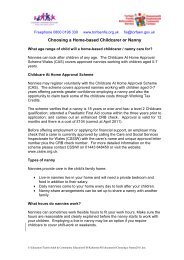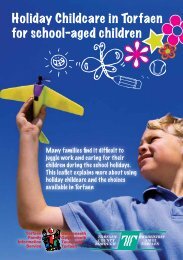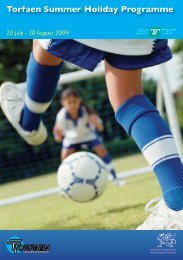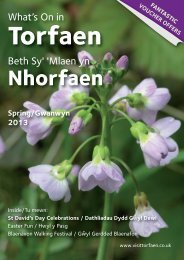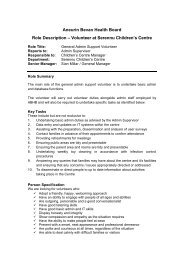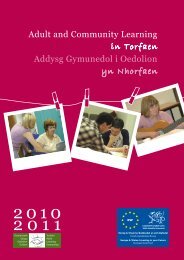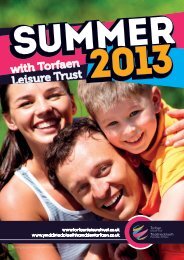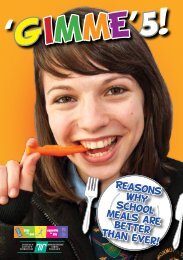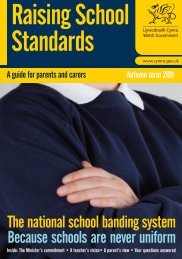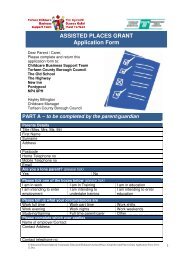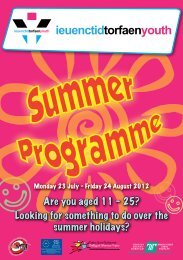Food and Health Guidelines - Torfaen Family Information Service
Food and Health Guidelines - Torfaen Family Information Service
Food and Health Guidelines - Torfaen Family Information Service
Create successful ePaper yourself
Turn your PDF publications into a flip-book with our unique Google optimized e-Paper software.
6. Menu Planning<br />
Special Diets<br />
The parent/guardian should inform the Early<br />
Years manager if their child requires a special<br />
diet, so that arrangements can be made<br />
to accommodate the child’s requirements.<br />
Children can be on a special diet for a<br />
number of reasons. Children with special<br />
needs may require the texture of the food to<br />
be modified in a way that makes it easier to<br />
eat e.g. pureed or mashed. Children may<br />
also include or exclude foods according to<br />
their religious <strong>and</strong>/or other beliefs.<br />
For children on a therapeutic diet, the<br />
parent/guardian or Dietitian will provide<br />
details of the children’s diet in a form of a<br />
diet sheet. These diets can include glutenfree<br />
(Coeliac), diabetic, nut-free or milk-free<br />
diets. Therapeutic diets for food allergies are<br />
not uncommon in young children. Common<br />
food allergies include milk, egg, wheat,<br />
peanuts, nuts, seeds, soya, shellfish, fish <strong>and</strong><br />
citrus fruits. A wide range of symptoms can<br />
occur when a child is exposed to an allergy<br />
such as milk protein in food, ranging from<br />
a mild reaction such as a rash to a very<br />
rapid <strong>and</strong> severe response where breathing<br />
becomes difficult (anaphylaxis).<br />
A management plant should<br />
include:<br />
• The child’s details.<br />
• <strong>Information</strong> on foods the child can <strong>and</strong><br />
cannot eat.<br />
• The emergency contact details for the<br />
parents or guardians.<br />
• The emergency procedure to use if an<br />
allergic reaction occurs.<br />
• The medication that the child can<br />
be given.<br />
• Any staff training required.<br />
• Any precautionary measures that are<br />
needed. (For example, for outings or<br />
special occasions<br />
• Review the diet on a regular basis,<br />
for example twice a year.<br />
In Early Years settings it is useful for a<br />
photograph of any children with allergies to<br />
be put up in the food preparation area with<br />
details of the food they are allergic to, <strong>and</strong> a<br />
mention of where to find their management<br />
plan, to help new or temporary staff.<br />
Sharing information<br />
with parents<br />
If parents are informed of what the child has<br />
throughout the day it will help parents to<br />
plan for the evening meal <strong>and</strong> will give them<br />
an overall picture of how well their child<br />
is eating.<br />
15



